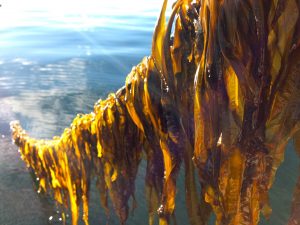Sea Vegetable Aquaculture

The CCAR is home to Maine’s leading research and development sea vegetable nursery, which began developing new cultivation techniques and seed stock for Maine’s growing aquaculture industry in 2003. Under the direction of Dr. Susan Brawley and in association with Sarah Redmond (2012- 2016), the nursery has successfully developed cultivation techniques for several native species from seed to harvest, including sugar kelp (Saccharina latissima), winged kelp (Alaria esculenta), skinny kelp (Saccharina latissima forma angustissima), horsetail kelp (Laminaria digitata), and dulse (Palmaria palmata). In 2015, we piloted field grow-out of laver (Porphyra umbilicalis), and expect to complete R & D for laver crops within the next few years. In 2016, we worked with the Maine Organic Farmers and Gardener’s Association (MOFGA) to pioneer organic certification of cultivated sea vegetables for our nursery seed and farmed crops. Cultivation techniques for native sea vegetable crops are optimized for commercial production at a nearby 34-acre open ocean aquaculture lease in Frenchman’s bay. The development of new sea vegetable crops in Maine has great potential to provide healthy sustainable seafood, support working waterfronts, and provide new opportunities to coastal communities.
Cultured marine macroalgae have a multitude of uses. Sea vegetables are vegetarian seafood, providing essential minerals and vitamins, health-promoting carbohydrates, fiber, proteins, and fats, and unique marine bioactive compounds (Wells et al., 2017). Besides their use as highly nutritious foods, they can also be utilized for skin care, aquaculture feed, in plant and animal agriculture, for pets, and for valuable bioactive extracts. Sea vegetables can be incorporated into other types of sea farms in an integrated multitrophic aquaculture (IMTA) design, creating more ecologically based production systems. Sea vegetables take up nitrogen, phosphorous, and carbon, while releasing oxygen, to improve water quality while providing additional crops. Sea vegetable aquaculture is a sustainable and environmentally responsible form of food production, requiring no arable land, no fertilizers, no pesticides or herbicides, and very little fresh water and fossil fuel.
In addition to our sea vegetable nursery located here at the CCAR, the University of Maine’s Darling Marine Center and the University of Maine at Machias both house sea vegetable nursery facilities. Other nurseries in the state include the Bigelow Laboratory for Ocean Science, Ocean Approved, and the University of New England.
Our research partners include Maine Sea Grant; Maine Sea Farms; Maine Coast Sea Vegetables; Springtide Seaweed, LLC, and a number of other sea farmers, researchers, organizations, and partners in New England and worldwide.
For more information on the sea vegetable aquaculture industry in Maine visit Maine Sea Grant’s Seaweed Aquaculture Industry Overview.
